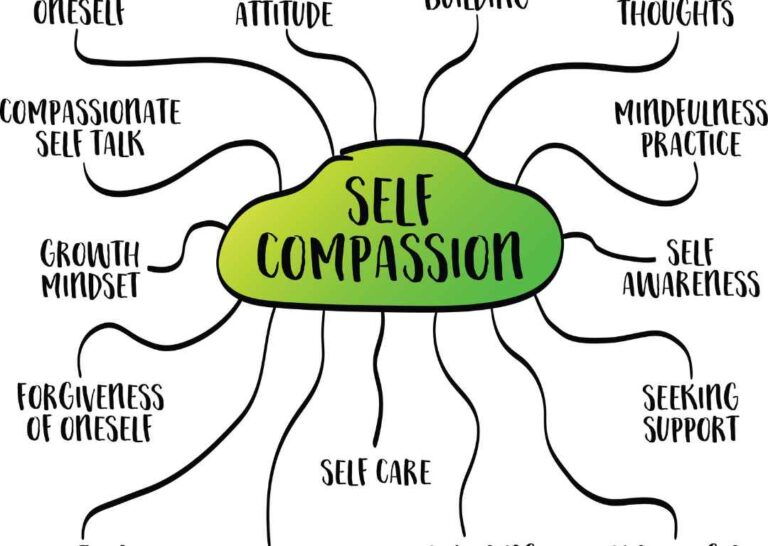The Power of Self-Compassion in Mental Health Recovery
What is self-compassion and why does everyone need it? Especially this season. When it comes to healing from emotional pain or mental illness, we often focus on therapy, medication, or coping skills. While these are all important, there’s another essential ingredient that often gets overlooked: self-compassion.
For anyone walking the path of mental health recovery, self-compassion can be one of the most powerful tools for healing. It’s not about being soft or making excuses—it’s about offering yourself the same kindness and understanding you would give a friend.
In this article, we’ll explore what self-compassion really means, how it helps in mental health recovery, and how to begin practicing it in daily life.
What Is Self-Compassion Anyway
Self-compassion is the practice of being gentle, kind, and supportive with yourself—especially during moments of suffering, failure, or self-doubt.
Dr. Kristin Neff, a leading researcher in this field, defines self-compassion as having three key elements:
- Self-kindness – Treating yourself with warmth and care, rather than criticism
- Common humanity – Recognizing that suffering and imperfection are part of being human
- Mindfulness – Being present with your pain without ignoring it or exaggerating it
In simple terms, self-compassion means talking to yourself like you would to someone you love.
Are You Too Hard On Yourself
For those living with depression, anxiety, PTSD, or past trauma, self-criticism often becomes second nature. You may have learned early on that your feelings weren’t valid, or that mistakes meant you were “bad” or “weak.”
Over time, this inner harshness can lead to shame, low self-esteem, and a belief that you’re unworthy of love or healing.
📊 According to a study published in the Journal of Anxiety Disorders, individuals with higher levels of self-compassion reported lower levels of anxiety, depression, and stress, and greater overall life satisfaction [1].
That means self-compassion isn’t just “nice”—it’s effective.
How Self-Compassion Supports Mental Health Recovery
Being Kind To Yourself Calms Your Inner Critic
Most people in recovery struggle with an internal voice that says things like:
– “I’m not doing enough.”
– “I should be better by now.”
– “I’m a failure for still feeling this way.”
Self-compassion challenges that voice. Instead of beating yourself up for struggling, it allows you to say:
“I’m doing the best I can. It’s okay to need time. I am still worthy.”
This shift can ease emotional suffering and build a sense of inner safety.
Being Kind To Yourself Encourages Resilience
When you approach setbacks with compassion rather than criticism, you’re more likely to bounce back and keep going.
📊 A 2014 study published in Clinical Psychology Review found that self-compassion helps people recover more quickly from failure and emotional distress, making it a powerful buffer in the face of adversity [2].
Self-Compassion Reduces Shame
Shame says: “There’s something wrong with me.”
Self-compassion says: “I’m human, and I’m doing my best.”
For trauma survivors or those with chronic mental illness, shame can be a major barrier to healing. Self-compassion helps reduce shame by normalizing pain and encouraging acceptance rather than judgment.
Self-Compassion Builds Emotional Regulation
When you’re kind to yourself, you create space to feel your emotions without being overwhelmed by them. This leads to better coping skills and fewer emotional outbursts or breakdowns.
Over time, self-compassion supports a calmer nervous system, more balanced moods, and a greater sense of inner peace.
4 Tips To Being Kind To Yourself
You don’t need hours of meditation or perfect mindfulness to start practicing self-compassion. Small shifts in how you speak to and care for yourself can make a big impact.
1. Change Your Self-Talk
Notice when you’re being harsh or critical with yourself. Pause and ask:
– Would I say this to a friend?
– What would a kind voice say instead?
Try gentle phrases like:
– “It’s okay to feel this way.”
– “I’m allowed to rest.”
– “Healing takes time, and I’m doing my best.”
2. Validate Your Emotions
Instead of dismissing your feelings, acknowledge them:
– “This is hard.”
– “I feel anxious, and that’s understandable.”
– “Of course I’m upset—this matters to me.”
Validation helps you move through emotions instead of avoiding or judging them.
3. Set Healthy Boundaries
Self-compassion means protecting your peace. This might look like:
– Saying no without guilt
– Taking breaks when needed
– Limiting time with people who drain you
Boundaries are an act of self-respect, not selfishness.
4. Practice Self-Soothing
When you’re overwhelmed, use calming techniques that nurture your body and mind:
– Deep breathing
– Gentle music or movement
– Drinking a warm cup of tea
– Wrapping yourself in a blanket or using comforting textures
Even small actions can help your nervous system feel more grounded.
Final Thoughts
Mental health recovery isn’t about being perfect—it’s about learning to be kind to yourself, even when you’re struggling.
Self-compassion doesn’t mean ignoring pain or pretending everything is fine. It means acknowledging your suffering with care, recognizing that healing takes time, and giving yourself the grace to rest, reflect, and grow.
If you’re walking the path of recovery, know this: You are worthy of kindness. You are allowed to be gentle with yourself. And in that gentleness, true healing can begin.
More Mental Health Articles To Read
New Recovery Coloring Book For Kids
Guide To Virtual Outpatient Programs
5 Tips To Cope With Scary News





















